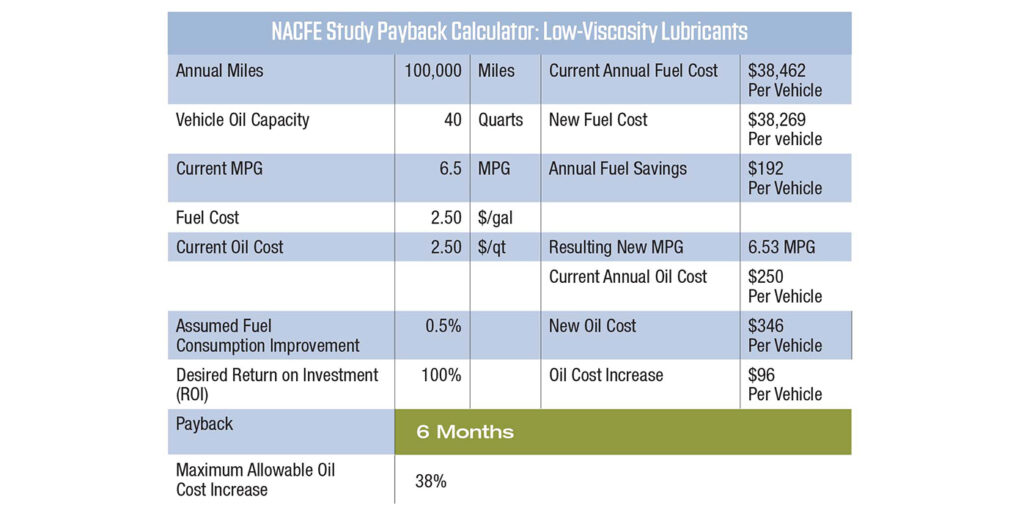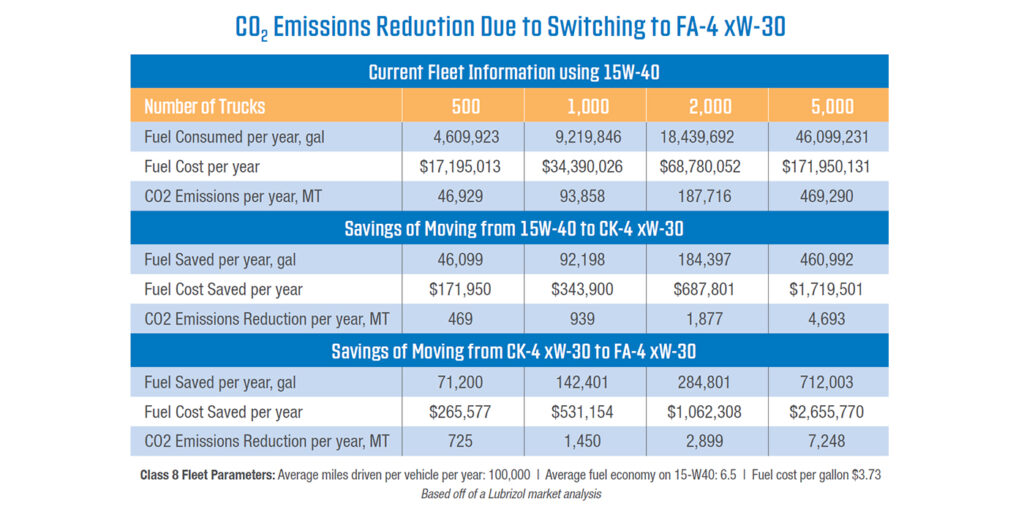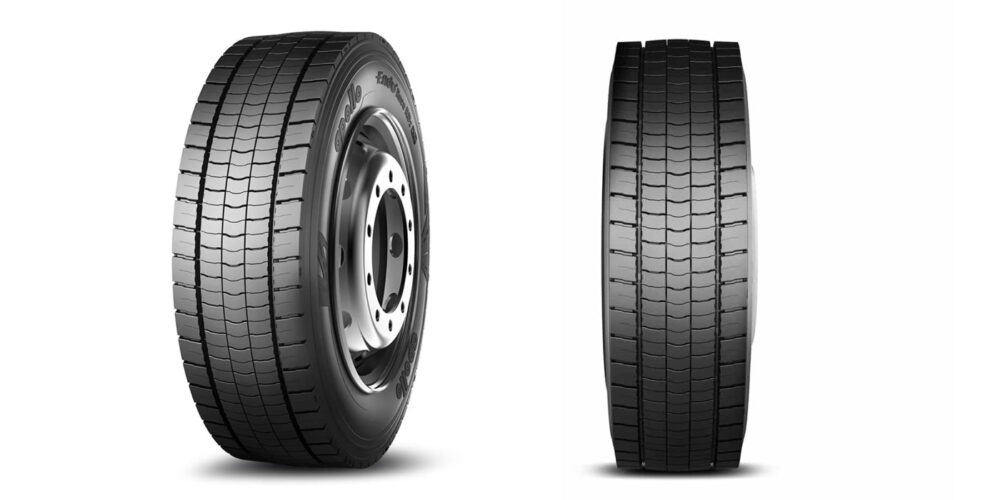Lower-viscosity engine oil formulations have been available in the heavy-duty trucking marketplace for nearly six years. Despite some attractive fuel economy benefits that these lower-viscosity formulations provide, they maintain just a slim market share among all available formulations. Why is this the case? It’s been shown that Class 8 over-the-road fleets can realistically expect fuel savings in the range of 0.5%–1.5% by switching from an API CK-4 certified 15W-40 formulation to 5W/10W-30 engine oil (worth noting: 15W-40 lubricants make up the majority of the market share). In addition, the savings from switching to the fuel-efficient API FA-4 variant can be expected to add a further 0.4%–0.7% of increased fuel efficiency.
CK-4 vs. FA-4: What’s the Difference?
In 2016, the American Petroleum Institute (API) made a fundamental change in how heavy-duty engine oils are certified for use throughout North America. In addition to introducing the new CK-4 performance category, API introduced FA-4—a separate specification for lower-viscosity engine oils specifically formulated to deliver enhanced fuel economy benefits for modern engine hardware via less resistance between moving engine parts. Per API requirements, both CK-4 and FA-4 oils deliver the same levels of high performance and engine protection.
In light of some of the recent challenges the trucking industry has dealt with, along with rising fuel costs, it’s worth investigating why many in the trucking space are forsaking an avenue by which they may be able to significantly impact their bottom line for the better. With this in mind, let’s tackle some common myths about lower viscosity and FA-4 lubricants:
Myth #1: Lower-viscosity lubricants don’t protect an engine as well
One of the most pervasive myths about lower-viscosity lubricants in the heavy-duty trucking industry is that thinner oils do not provide as much robust protection as a thicker oil. Though this may have once been true, advances in additive chemistry and formulation technology have enabled modern lubricants to deliver outstanding engine protection in lower-viscosity formulations.
Established performance resides within the CK-4 and FA-4 performance categories themselves. All certified lubricants must meet the same performance criteria no matter the viscosity grade. Consider also that North American OEMs factory fill most new-model engines with 10W-30 grade lubricants, indicating their confidence that lower viscosities are a beneficial choice and ideal for modern engine design. Additive companies, oil companies, and OEMs have generated hundreds of millions of miles on lower-viscosity oils and API FA-4 oils in real-world field testing. Testing covers all major OEM engines in a wide variety of duty cycles. This testing is done to validate the performance and durability of lower- viscosity CK-4 and FA-4 engine oils.
Myth #2: Using FA-4 will void your warranty
Right now, three engine OEMs explicitly approve the use of FA-4 lubricants in their vehicles—Detroit Diesel, Cummins, and Navistar. And while the remaining major OEMs may still recommend and factory fill with CK-4, that does not necessarily mean using it will cause your vehicles to fall out of warranty.
It can be helpful to follow recommended guidelines—and when in doubt, consult your manufacturer. For example, the Technology and Maintenance Council (TMC) will be publishing a new recommended practice (RP) in their 2022-2023 RP manual, on how heavy-duty vehicle operators can manage their switch to lower-viscosity engine lubricants. The guidelines are as follows:
• If your fleet operates engines that are newer than model-year 2010, and those vehicles are made by OEMs that approve the use of FA-4 lubricants, they are a good option for those vehicles.
• For newer vehicles by OEMs who have not explicitly recommended FA-4, TMC recommends contacting the manufacturers to determine if oil recommendations have recently changed to include FA-4.
• For any vehicles newer than model-year 2010, TMC recommends fleets at least consider adopting 10W-30 or 5W-30 CK-4 lubricants to take advantage of the fuel efficiency advantages.
Myth #3: FA-4 will cost me more money.

There is some truth in this myth—barrel to barrel, FA-4 lubricants are more expensive than their CK-4 counterparts. But that doesn’t mean it will result in higher total cost for you.
By contributing to enhanced fuel economy, FA-4 lubricants can in fact lead to less total overall fuel costs for you. Consider that fuel costs represent about 24% of the average fleet’s cost per mile, according to the ATRI Trucking Review. With fuel prices rising, that figure could grow, making any way to save on fuel costs more attractive.
According to the North American Council for Freight Efficiency (NAFCE), the benefits of upgrading to lower-viscosity lubricants are clear cut, and can lead to a return on investment in as little as six months. This is a bigger impact than some other fuel-economy measures (different tires, for example, or aerodynamic add-ons) can have, and certainly worth investigating if you’re interested in cutting back on fuel costs.

Lubrizol has also performed its own analysis of potential fuel savings. Depending on the size of your fleet, switching from a CK-4 lubricant to FK-4 lubricants can lead to a potential annual savings of more than $2 million on fuel costs while dramatically reducing your fleet’s CO2 emissions.
Myth #4: Real-world results won’t match FA-4 testing data.
Real-world performance does not always match what is seen in the lab—and when measuring fuel economy, everything from individual driver behavior to weather conditions can have an impact. Given these variables, it’s reasonable to question whether the fuel economy benefits of FA-4 will translate to your fleet.
At Lubrizol, we have field-tested FA-4 lubricants in real-world engines from a variety of OEMS, generating over 75 million miles of testing. Trucks our teams have tested include new models designed to be filled with FA-4 lubricants, and older-model trucks where FA-4 is not specified by the manufacturer. Through this testing, we have seen heavy-duty fleets achieve significant fuel economy savings all while providing their trucks with outstanding protection. In one test, a 10W-30 FA-4 formulation helped save a fleet 2.2% savings on fuel costs when compared with a conventional CK-4 10W-30 formulation. Considering that fuel is often one of the top operating costs for fleets, these kinds of results can make a meaningful difference to your bottom line.
If you’d like to see the potential, it’s worth starting the conversation with your oil supplier about potentially running some testing of your own. A reliable supplier should be able to help you run FA-4 testing without full conversion entirely, and you can see the impact for yourself. Because despite some of these pervasive myths, FA-4 lubricants are one of the best ways fleet managers have to boost fuel economy and save on cost. Start the conversation today.














